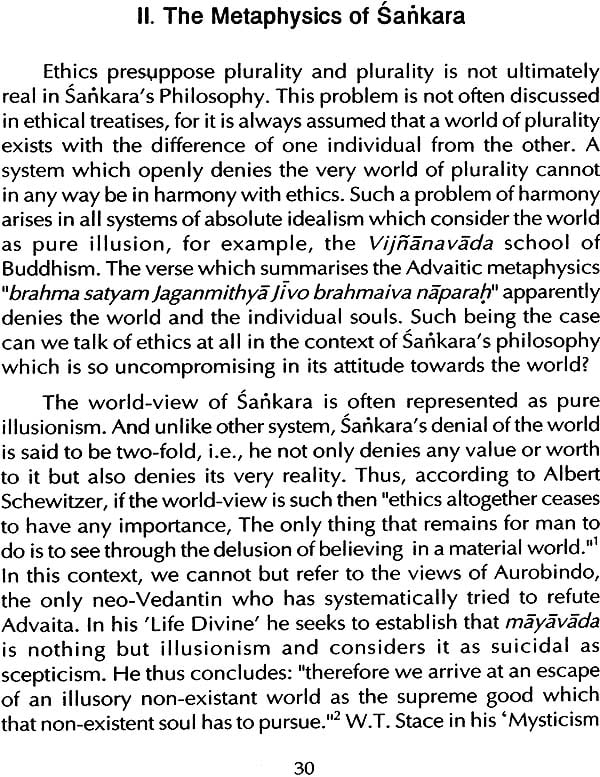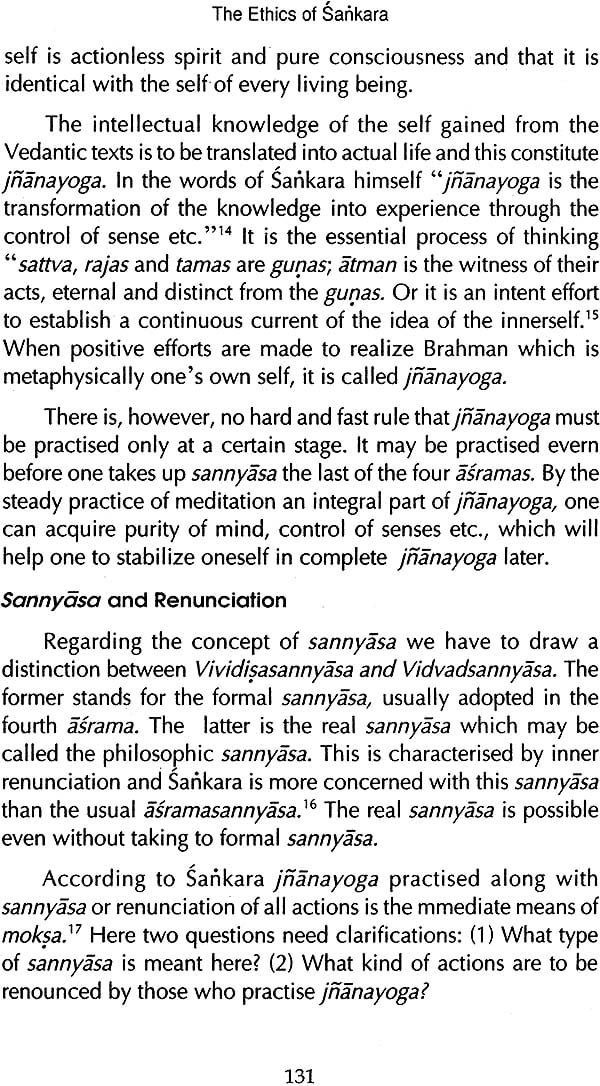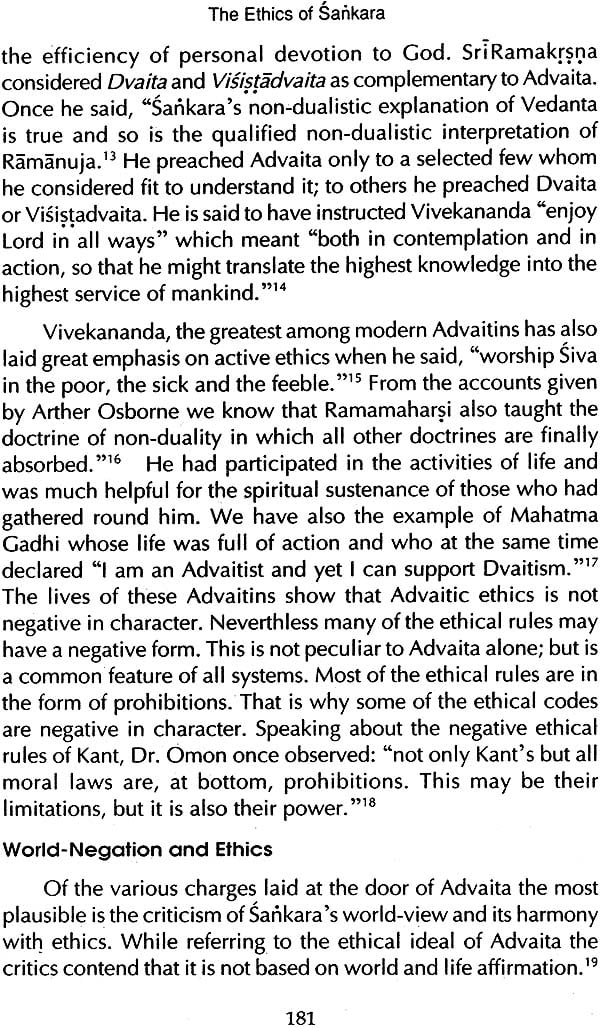
Ethics of Sankara
Book Specification
| Item Code: | NAH340 |
| Author: | Dr. K.N. Neelakantan |
| Publisher: | Publication Division, University of Calicut |
| Language: | English |
| Edition: | 2012 |
| ISBN: | 9788177481723 |
| Pages: | 200 |
| Cover: | Paperback |
| Other Details | 8.5 inch x 5.5 inch |
| Weight | 250 gm |
Book Description
About the Book
The aim of this work is to enlarge the scope of our study on Advaitavedanta and make it more significant from the point of ethics. It has been the fashion with some critics to treat Advaita ethics with suspicion and complain that in Advaita there is no logical place for ethics. In this book the author reviews all the fundamental concepts of Sankara with a view to explicate their ethical implications. The work presents a full account of Sankara’s treatment of ethics and his defence of the same day of Advaita Metaphysics.
Preface to the First Edition
The present work substantially represents the thesis submitted by the present author for the PhD. degree of the University of Kerala in 1973. An abridged version of this work under the title Advaita dharmam was published in Malayalam by the Stage Institute of Languages in 1982. It has been thoroughly revised and is now being published in the Calicut University Sanskrit Series.
The aim of this work is to enlarge the scope of our study on Advaita Vedanta and make it more significant from the point of view of ethics. It has been the fashion with some critics to treat Sarikara’s ethic with suspicion and complain that in Advaita, there is no logical place for ethics. In the following chapters, I have tried to review a” the fundamental concepts of Sarikara with a view to explicate their ethical implications. The work presents a full account of Sarikara’s treatment of ethics and his defence of the same by Advaita metaphysics.
Sanskrit terms of technical character are not translated in this work and diacritical marks are omitted in the case of we” known words.
I owe a debt of sincere gratitude to my late Professor A.G. Krishna Warrier for introducing me to this work. I also thank the University of Kerala for providing me with necessary facilities for research. My thanks are also due to Dr. N.V.P. Unithiri, Head of the Department of Sanskrit for including this work in the Calicut University Sanskrit Series.
Introduction
Sarikara, the great exponent of Advaita is one of the best known figures in Indian Philosophy and yet his importance in the sphere of ethics has not been properly appreciated. The modern writings on Sarikara, both in the East and the West, being too much pre-occupied with his metaphysics have not attached great importance to the system of ethics that lies embodied in his Gitabhasva as well as in his other works.’ The importance of Bhagavad Gita itself in the field of Hindu ethics cannot be ignored; it is one of the triple text of Advaita, the other two being, the Upansisads and the Brahmasutras. In fact, no study on Sarikara’s ethics is possible without a preference to his exposition of the triple text. When the Upansisads and the Brahmasutras mainly deal with metaphysical problems, Bhagavad Gita is concerned with ethical problems; it is the most original and profound work on the philosophy of morals in Hinduism. Though it is incumbent on a reputed Vedantin to write commentaries on the presthanatraya: it was not only motive of Sarikara. His main ask was to show how Hindu ethics was in perfect consonance with the Advaitic metaphysics. One has only to go through his introduction to the Gita to understand the importance he attaches ethical problems. His declaration, in this context, that the report of Bhagavad Gita is ethics (dharma) and that his aim is to interpret it, shows his concern for ethical problems. The question of ethics in Sarikara’s philosophy and its relevance to i metaphysics, thus, can be properly understood only by a combined study of his commentaries on the Upanisads, the Bahrmasutras and the Bhagavad Gita.
The ethics of Sarikara as expounded in the Bhagavad Gita Bhasya and its relation to the metaphysical ideas of Advaita has not been taken up for a special study. Consequently, Advaita has been often misrepresented and its ethical implications grossly misunderstood even to this day. In the land of its own origin Advaita was an object of attack even from the days of Bhaskara and in our own century it has been assailed by eminent Indians like B.C. Tilak and Aurobindo. In the West, however, opinion for and against Advaita was formed seriously from the nineteenth century - a century marked by a comparative study in literature, religion and philosophy. The objections are many, and one can indeed feel a certain sympathy with some of them. As a matter of fact, the later two schools of Vedanta connected with Ramanuja and Madhava rose as reactions against Advaita, which they thought, rendered ethical values meaningless. That Advaita cuts at the very root of ethics is not a new criticism; it had started even from the time of Ramanuja and the new critics are only presenting the charge in a modern grab. Especially in our century with the development of social awareness, religions have ceased to become merely dogmatic: they are interpreted so as to give more emphasis on social service and philanthropy. With the emergence of these ideas a philosophy like Advaita with its theory of maya and its insistence on nivrtti and individual salvation may present quite a few problems. These doctrines are often alleged to be obstacles to India’s social uplift. Most of the ethical and social problems in India have been attributed to the influence of Advaita Vedanta. Indeed, this opinion calls for critical examination.
Broadly speaking such objections against Sarikara’s system may take two forms: They may be directed against his metaphysics i.e., against the concept of the Absolute, the theory of maya etc. They also may be directed against his ethics, i.e., against the ideas of nivrtti, jivanmukti etc. However such charges are ultimately found to be based on ethical considerations, That is, the critics thought that Advaita either did not give any logical place for ethics or considered it as complementary to its metaphysics. Among these Western critics mention may be made of J.N. Farquhar, Albert Schweitzer and John Mckenzie for the reason that their writings raise some fundamental issues which has not been solved satisfactory even today.
According to them Advaitins were not preoccupied with ethics and they were only concerned with philosophical speculations. Sarikara, it is true, does not build up an ethics based on his own system of philosophy as a modern philosopher would do. That he gives only a complementary place for ethics in his scheme of mokse and that even there, he failed to emphasise its need even as a means are the two criticisms frequently levelled even by the sympathetic writers on Sarikara. But why are such criticisms brought against Advaita? Is it because Sarikara’s system has no solid basis for ethics? Or is it because of the fundamental difference in the East-West conceptions of ethics? In his assessment of East-West conceptions of ethics Sir Charles Eliot maintains that when the West “generally aims at teaching a man how to act: Eastern ethics forming a character. A good character will, no doubt, act rightly when circumstances require action, but he need not seek occasion for action; he may even avoid them.”! This he attributes to the pessimistic attitude of Indians - a pessimism of a peculiar type whose watch-word is “world process is without beginning or end and that man must learn how to make the best of it.” “They clearly feel a peculiar interest”, continues the author, “in defining the relation of the soul to God, but they rarely ask why should I be good or what is the sanction of morality.” This attitude according to him is responsible for the astonishing absence of discussions on free will which is a much talked-about subject in the West. These charges, we shall prove in the course of our discussion, are not well founded. Such problems are elaborately discussed in the Bhagavad Gita when it deals with the question of moral act and moral agency.
Contents
| Preface to the Second Edition | 5 | |
| Preface to the First Edition | 7 | |
| Abbreviations | 10 | |
| 1 | Introduction | 11 |
| 2 | The Metaphysics of Sarikara | 30 |
| 3 | The Problems of Ethics in Sankara’s Philosophy - I | 62 |
| 4 | The Problems of Ethics in Sarikara’s Philosophy - II | 83 |
| 5 | Pravrtti dharma | 113 |
| 6 | Nivrtti dharma | 128 |
| 7 | The Concept of Perfection | 140 |
| 8 | Actions of the Perfected Man | 163 |
| 9 | Conclusion | 177 |
| 10 | Bibliography | 193 |













